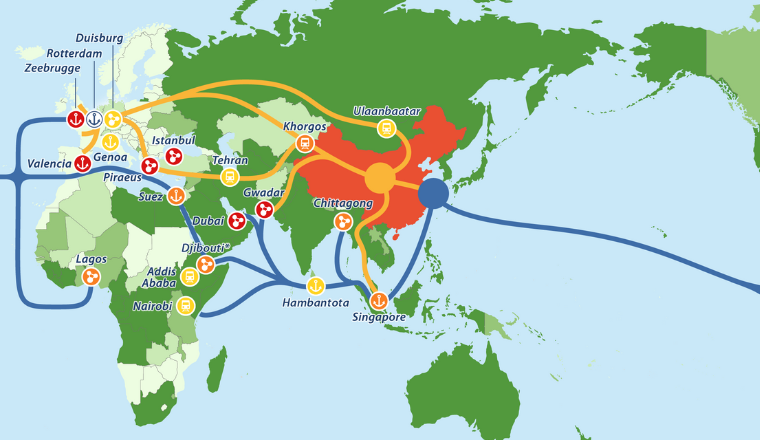Belt and Road Initiative: Impact on IP in the MENA Region

Table of Contents
The power of Intellectual Property is gaining global traction as a key driver towards sustainable global industrialization, and the Belt and Road Initiative (BRI), has impacted Intellectual Property Rights (IPRs) and enforcement mechanisms in various ways, particularly in the Middle East and North Africa (MENA) region.
On the one hand, the BRI has led to increased Intellectual Property disputes and challenges, thus shedding light on major oversights within federal IP legislation, particularly in countries with weaker IP laws and enforcement adherences. It has been made clear that there were far-reaching implications regarding intellectual property rights and its enforcement ideologies in certain regions.
On the other hand, the BRI has provided opportunities for increased cooperation and collaboration within IP-related fields, including the sharing of IP-related knowledge, technological advancements, and IP-based best practices, on a global scale.
In this article, we will briefly touch upon how the BRI has impacted the MENA region in terms of economic status and more importantly, its implications on regional Intellectual Property operatives.
What is the Belt and Road Initiative?
The Belt and Road Initiative (BRI) is a Chinese development strategy and framework that focuses on bolstering connectivity and cooperation between China and Europe, Asia, and Africa, and is constituent of more than 60 participant countries.
The initiative revolves around the construction of infrastructure projects, such as railways, ports, and power plants, in order to improve economic relations and trade between the participating countries.
Expert Insight: Since its launch in 2013, the BRI has been criticized for a lack of transparency and for being a vehicle for Chinese companies to gain access to natural resources in other countries. However, the BRI has also been praised for its potential in boosting economic growth throughout participating countries and for its focus on developing infrastructure in countries that are in dire need of foreign investment opportunities, especially as the global economy recovers from COVID.
Since its launch in 2013, the BRI has been criticized for a lack of transparency and for being a vehicle for Chinese companies to gain access to natural resources in other countries.
Impact, Implications, and Advantages: MENA Intellectual Property
The impact of the BRI on intellectual property in the Middle East and North Africa has been positive, overall. The initiative has led to several countries’ increased treaty participation, such as Oman, becoming a member of the Madrid Protocol in 2016 and the adoption of domestic Intellectual Property legislation. A notable example of this is Qatar enacting its first trademark law in 2017.
This is a sizable indication that MENA-based countries are beginning to grasp the importance of empowering IP legislation, to protect incoming business opportunities and to ensure an inviting ecosystem for foreign investments.
To better understand the impact of the BRI in the MENA region, it would be useful to look at specific country examples.
-
United Arab Emirates
The UAE is probably one of the most technologically advanced countries in the region, and the BRI has clearly provided opportunities for increased commercial growth and collaboration both in the areas of IP and overall economic expansion. Institutional economic entities such as DP World, the UAE’s flagship port authority; Etisalat, the country’s national telecommunication provider, and Emirates Global Aluminum, have amassed humongous benefits from the BRI.
With contracted projects that included multi-million dollar port infrastructure development plans and the upheaval of an entirely fiber-optic network to facilitate naval-based communication, the UAE has greatly benefitted. From an Intellectual Property perspective, these projects have seen a surge in the application of technological advancements that were protected under federal patent and design laws.
-
Saudi Arabia
In Saudi Arabia, the BRI has enabled tangible economic growth and development, particularly in the areas of technology and innovation. Today, Saudi Arabia is adamant to diversify its economy through strategies apart from its reliance on oil. And truly so, the BRI has provided a surplus of foreign investment and access to overseas technology and innovation from China. All of which required very well-thought-of IP protection and enforcement strategies.
Expert Insight: One of Saudi Arabia’s non-oil-based institutions, Ma’aden, was heavily involved in the development of mining and mineral processing facilities through the use of patented Chinese technology, under the pretense of the BRI. Not only did China agree to license said technology to Saudi Arabia as a nation; but the country has decided to forfeit all its rights to the said patent, in efforts of ‘good faith’.
-
Qatar
Despite it being one of the smallest countries in the region geographically, Qatar was one of the most heavily intertwined nations with the BRI. As mentioned before, the BRI was one of the main driving factors to the nation’s enactment of its first federal intellectual property legislation, in 2017.
Qatari-based real estate giant, Diar, won most real estate construction bids and was also involved in one-of-a-kind mixed-use community infrastructure. Diari, has since then, leveraged its newly found regional stance as a leading developer to further its market presence and share.
-
Morocco
The Moroccan government has highly welcomed the BRI, as it aligned with its efforts to expand its foreign investment portfolio. The BRI has also shed light on critical loopholes within its federal Intellectual Property legislation and it has taken it upon itself to strengthen such, in a bid to solidify IP enforcement for the good of both domestic and international foreign investment opportunities.
A key Morocco-based stakeholder, partaking in the BRI, is its’ National Office of Electricity and Drinking Water (ONEE). The ONEE has been deeply involved in the development of renewable energy sources and has led several infrastructure projects, as it leveraged its expertise in the energy sector. Not only did it put the Moroccan renewable energy source industry on the map, but it has highly improved incoming technologies from across the globe, wishing to set up shop in Morocco, as third-party collaborators.
The BRI has had a slightly negative impact on MENA countries, in terms of its ability to attract and maintain foreign investment opportunities. It is a known fact that most multinational companies revolve their foreign expenditure decisions on the strength and prominence of a country's IPR regime and legislature.
And more than most, MENA countries are perceived as being less protective in terms of their federal IPR laws. This has caused some countries to seem as riskier investment opportunities, as compared to other countries.


On A Final Note: The BRI in the MENA Region
The Belt and Road Initiative has been a major catalyst for socio-economic development in the Middle East and North Africa. One of its salient features is that it has offered novel and diversified opportunities for intellectual property protection, which has aided in unleashing innovation and creativity among local companies.
However, as history has shown, relevant laws must be enacted in order to ensure that businesses, both overseas and regional, have a concise and lawful framework, within which operations can be both safe and efficient. It remains to be seen whether governments will take full advantage of these possibilities or not. But so far, the positives outweigh the negatives.
Standing at the forefront of IP, Abou Naja Intellectual Property is committed to empowering clients to further leverage the dominion of IP & to fortify the sustainable continuity of their business.
We invite you to get in touch with us at [email protected], to claim complimentary and highly personalized counsel, pertaining to any of your IP-based queries.
Abou Naja Intellectual Property stands ready to support.






